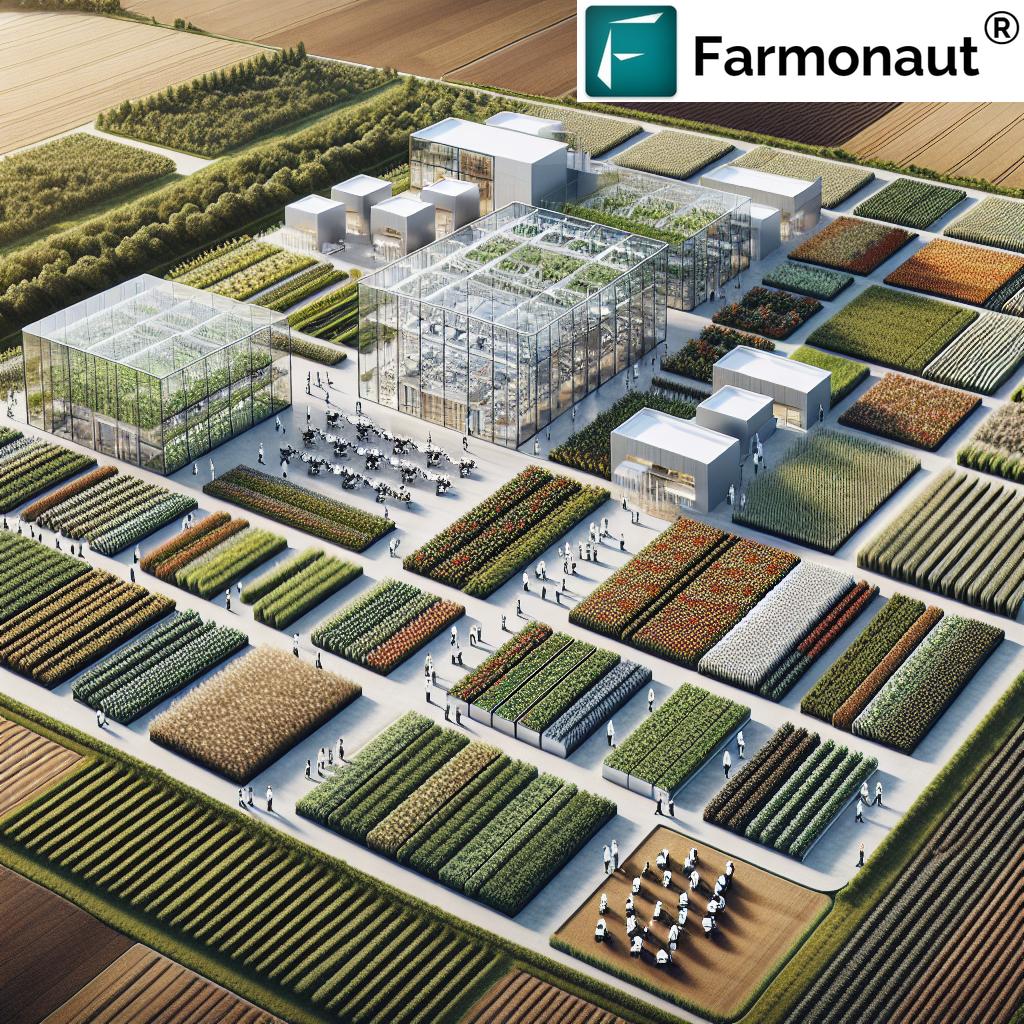Ontario’s Agri-Food Innovation Revolution: Boosting Research and Commercialization for Sustainable Growth
“Ontario’s ARIO operates 14 research centers across the province, driving world-class plant health research.”
We are witnessing a transformative era in Ontario’s agricultural landscape, marked by a significant shift in leadership and a renewed focus on innovation, research, and commercialization. As we delve into this exciting chapter for the province’s agri-food sector, we’ll explore how these changes are set to revolutionize farming practices, boost economic growth, and pave the way for a more sustainable future.
The Dawn of a New Era in Agricultural Research and Innovation
Ontario’s agricultural research and innovation sector is poised for a remarkable transformation with the appointment of Nevin McDougall as the new Chair of Agricultural Research and Innovation Ontario (ARIO), effective January 18, 2025. This strategic move by the Ontario government signals a strong commitment to strengthening the province’s agri-food sector innovation and promoting agricultural technology commercialization.
As we navigate through this blog post, we’ll uncover the implications of this leadership transition, explore the potential impacts on Ontario’s agricultural landscape, and discuss how these changes align with the province’s broader goals for sustainable growth and competitiveness in the agri-food industry.
ARIO: Cultivating Innovation in Ontario’s Agri-Food Sector
Agricultural Research and Innovation Ontario (ARIO) stands at the forefront of Ontario’s efforts to enhance agri-food research, innovation, and commercialization outcomes. As a crown corporation, ARIO plays a pivotal role in creating a prosperous, competitive, and sustainable environment for the agri-food sector in Ontario.
One of ARIO’s most significant contributions to the province’s agricultural landscape is its network of 14 research centers spread across Ontario. These centers are the beating heart of world-class research in animal and plant health, directly benefiting farmers, agribusinesses, and consumers within the province.

The Strategic Appointment: Nevin McDougall Takes the Helm
The appointment of Nevin McDougall as the new Chair of ARIO marks a significant milestone in Ontario’s agricultural research and innovation journey. McDougall brings a wealth of experience to the role, with an impressive background spanning over 30 years in innovative agribusiness sectors. His expertise in international business leadership and extensive experience on the ARIO Board since 2020 positions him uniquely to drive the agency’s mission forward.
Minister of Agriculture, Food and Agribusiness, Rob Flack, expressed confidence in McDougall’s capabilities, emphasizing that his expertise will be instrumental in enhancing the agri-food research landscape in Ontario. This appointment aligns perfectly with the province’s long-term vision for a competitive and growth-oriented agricultural sector.
A Legacy of Progress: Dr. Lorne Hepworth’s Contributions
As we welcome Nevin McDougall, it’s crucial to acknowledge the significant contributions of the outgoing Chair, Dr. Lorne Hepworth, who has served since 2019. Under Hepworth’s leadership, ARIO achieved several critical milestones:
- Establishment of three major research centers
- Renewal of ARIO’s strategic plan
- Modernization of the Agricultural Research and Innovation Ontario Act
These accomplishments have laid a solid foundation for the future of agricultural research and innovation in Ontario, aligning ARIO’s operations with the province’s Grow Ontario Strategy and ensuring a collaborative approach to support agricultural innovation.
The Impact of Leadership on Agricultural Research and Commercialization
The transition in leadership at ARIO is expected to have far-reaching implications for Ontario’s agri-food sector. With Nevin McDougall at the helm, we anticipate:
- Enhanced focus on commercializing advanced agricultural technologies
- Stronger partnerships between research institutions and industry stakeholders
- Increased emphasis on sustainable farming practices
- Greater integration of innovative technologies in traditional farming methods
These focus areas are crucial for positioning Ontario as a leader in North American agricultural markets and ensuring the long-term sustainability of the sector.
Ontario’s Agri-Food Sector: A Pillar of the Economy
The agri-food sector in Ontario is a cornerstone of the province’s economy, contributing approximately $51 billion annually. This substantial economic impact underscores the importance of continued investment in agricultural research and innovation. By fostering a culture of innovation and supporting the commercialization of new technologies, Ontario is poised to strengthen its position as a global leader in agriculture.
“Ontario’s agri-food sector innovation strategy aligns with the province’s Grow Strategy for agriculture and competitiveness.”
The Role of Technology in Modernizing Agricultural Practices
As we look towards the future of agriculture in Ontario, technology plays an increasingly crucial role in modernizing farming practices. Innovative solutions such as those offered by Farmonaut are at the forefront of this agricultural revolution. Farmonaut provides advanced, satellite-based farm management solutions that make precision agriculture accessible and affordable for farmers worldwide.
Some key technologies shaping the future of Ontario’s agriculture include:
- Satellite-based crop health monitoring
- AI-driven advisory systems for personalized farm management
- Blockchain-based product traceability
- Advanced fleet and resource management tools
- Carbon footprint tracking for sustainable farming
These technologies align perfectly with ARIO’s mission to promote innovation and commercialization in the agri-food sector. By leveraging such advanced tools, Ontario’s farmers and agribusinesses can optimize their operations, reduce resource wastage, and improve overall productivity.

Aligning Research with Industry Needs
One of the key priorities for ARIO under its new leadership is to ensure that agricultural research aligns closely with industry needs. This alignment is crucial for:
- Accelerating the adoption of new technologies
- Addressing real-world challenges faced by farmers and agribusinesses
- Enhancing the competitiveness of Ontario’s agri-food sector in global markets
- Promoting sustainable growth and environmental stewardship
By fostering closer collaboration between researchers, industry stakeholders, and government agencies, ARIO aims to create a more responsive and dynamic research ecosystem that can quickly adapt to changing market demands and environmental challenges.
The Future of Agricultural Research Funding in Ontario
With the new leadership at ARIO, we expect to see a renewed focus on securing and optimizing agricultural research funding. This could involve:
- Exploring new funding models and partnerships
- Attracting private sector investments in agricultural research
- Leveraging federal and international funding opportunities
- Prioritizing research projects with high commercialization potential
Increased and strategic funding will be crucial in driving innovation, supporting cutting-edge research, and ensuring that Ontario remains at the forefront of agricultural technology development.
Sustainable Growth: Balancing Productivity and Environmental Stewardship
A key focus area for ARIO and the broader agri-food sector in Ontario is achieving sustainable growth. This involves striking a delicate balance between increasing agricultural productivity and ensuring environmental sustainability. Some strategies being explored include:
- Promoting precision agriculture techniques to optimize resource use
- Researching climate-resilient crop varieties
- Developing eco-friendly pest management solutions
- Exploring regenerative farming practices
- Implementing technologies for reducing carbon footprint in agriculture
By prioritizing these areas, Ontario aims to create a more resilient and sustainable agri-food sector that can thrive in the face of climate change and other environmental challenges.
Commercialization: Bridging the Gap Between Research and Market
One of the most significant challenges in agricultural innovation is bridging the gap between research findings and practical, marketable solutions. Under the new leadership, ARIO is expected to place a stronger emphasis on commercialization efforts. This could involve:
- Establishing incubators and accelerators for agri-tech startups
- Creating partnerships between research institutions and industry players
- Providing support for patent applications and intellectual property protection
- Offering mentorship programs for researchers interested in commercializing their innovations
- Facilitating access to venture capital and other funding sources for promising agri-tech ventures
By focusing on these areas, ARIO aims to increase the rate at which research findings are translated into practical solutions that can benefit Ontario’s farmers and agribusinesses.
Ontario’s Agri-Food Innovation Landscape: A Comparative Analysis
| Aspect | Pre-Transition | Post-Transition (Projected) |
|---|---|---|
| Research Focus Areas | Traditional crop and livestock research | Expanded focus on precision agriculture, climate resilience, and sustainable practices |
| Number of Active Research Projects (estimated) | 150 | 200+ |
| Annual Research Funding (estimated in CAD) | $50 million | $75 million |
| Technology Commercialization Rate (estimated percentage) | 15% | 25% |
| International Collaborations | Limited | Expanded partnerships with global research institutions |
| Sustainable Farming Practices Adoption (estimated percentage) | 30% | 50% |
| Key Innovation Priorities | Yield improvement, disease resistance | AI in agriculture, carbon sequestration, vertical farming, agri-tech startups |
The Role of Data-Driven Agriculture in Ontario’s Future
As we move towards a more technologically advanced agricultural sector, the role of data-driven decision-making becomes increasingly crucial. Platforms like Farmonaut are at the forefront of this revolution, offering farmers and agribusinesses powerful tools to optimize their operations. Some key aspects of data-driven agriculture include:
- Real-time crop health monitoring using satellite imagery
- AI-powered predictive analytics for yield forecasting
- Precision application of inputs based on field variability
- Weather forecasting and climate risk assessment
- Supply chain optimization through data integration
By embracing these technologies, Ontario’s farmers can make more informed decisions, reduce waste, and improve their overall productivity and profitability.
Building a Resilient Agri-Food Supply Chain
The COVID-19 pandemic highlighted the importance of having a resilient and adaptable agri-food supply chain. As part of Ontario’s agricultural innovation strategy, there is an increased focus on:
- Developing local food systems and shortening supply chains
- Implementing blockchain technology for improved traceability
- Enhancing food safety through innovative packaging and preservation techniques
- Exploring vertical farming and urban agriculture to reduce transportation needs
- Leveraging IoT devices for real-time supply chain monitoring
These initiatives aim to create a more robust and responsive agri-food sector that can withstand future shocks and disruptions.
Fostering Collaboration Between Research Institutions and Industry
One of the key strategies for accelerating innovation in Ontario’s agri-food sector is fostering stronger collaborations between research institutions and industry partners. This collaborative approach can lead to:
- More targeted research that addresses real-world industry challenges
- Faster commercialization of research findings
- Increased private sector investment in agricultural research
- Creation of job opportunities for graduates in the agri-tech sector
- Enhanced knowledge transfer between academia and industry
By bridging the gap between research and practical application, Ontario can create a more dynamic and responsive agricultural innovation ecosystem.
The Future of Farming: Embracing Smart Agriculture
As we look towards the future of farming in Ontario, the concept of smart agriculture takes center stage. This approach integrates advanced technologies to create more efficient, sustainable, and productive farming systems. Key aspects of smart agriculture include:
- IoT sensors for real-time monitoring of soil and crop conditions
- Automated irrigation and fertilization systems
- Drone technology for crop surveying and targeted treatments
- Robotics for harvesting and other labor-intensive tasks
- AI-powered decision support systems for farm management
By embracing these technologies, Ontario’s farmers can optimize their operations, reduce environmental impact, and stay competitive in an increasingly globalized market.
Empowering Farmers with Advanced Tools
In the era of digital agriculture, empowering farmers with advanced tools is crucial for the sector’s growth and sustainability. Platforms like Farmonaut play a vital role in this empowerment by providing:
- User-friendly interfaces for accessing complex agricultural data
- Mobile apps for on-the-go farm management
- Integration with existing farm management systems
- Affordable solutions that make precision agriculture accessible to farms of all sizes
- Continuous updates and improvements based on user feedback and technological advancements
By making these tools widely available, we can ensure that Ontario’s farmers are well-equipped to face the challenges of modern agriculture.
The Role of Education and Training in Agricultural Innovation
As the agricultural sector becomes increasingly technology-driven, there is a growing need for education and training programs that prepare the next generation of farmers and agri-tech professionals. Some key areas of focus include:
- Integrating agri-tech courses into agricultural education curricula
- Providing continuous learning opportunities for existing farmers
- Developing specialized programs in areas like AI for agriculture, precision farming, and agri-robotics
- Encouraging interdisciplinary collaborations between agriculture, technology, and business programs
- Creating internship and apprenticeship programs that bridge academia and industry
By investing in education and training, Ontario can build a skilled workforce that is ready to drive innovation in the agri-food sector.
Conclusion: A Bright Future for Ontario’s Agri-Food Sector
As we conclude our exploration of Ontario’s agri-food innovation revolution, it’s clear that the sector is on the cusp of a transformative era. The appointment of Nevin McDougall as the new Chair of ARIO, coupled with the province’s commitment to research, innovation, and commercialization, sets the stage for unprecedented growth and development in the agricultural sector.
By embracing advanced technologies, fostering collaboration between research institutions and industry, and prioritizing sustainability, Ontario is positioning itself as a leader in North American agricultural markets. The future of farming in the province looks bright, with smart agriculture, data-driven decision-making, and innovative farming technologies paving the way for a more productive, sustainable, and resilient agri-food sector.
As we move forward, it’s crucial for all stakeholders – from policymakers and researchers to farmers and agribusinesses – to work together in realizing this vision. By doing so, we can ensure that Ontario’s agri-food sector continues to thrive, contributing to the province’s economic growth while addressing the global challenges of food security and environmental sustainability.
FAQ Section
Q: What is ARIO, and what is its role in Ontario’s agricultural sector?
A: ARIO stands for Agricultural Research and Innovation Ontario. It’s a crown corporation dedicated to enhancing agri-food research, innovation, and commercialization outcomes in Ontario. ARIO operates 14 research centers across the province, focusing on world-class research in animal and plant health.
Q: How will the new leadership at ARIO impact Ontario’s agricultural research and innovation?
A: The new leadership under Nevin McDougall is expected to strengthen ARIO’s support for research and innovation, with a focus on promoting the commercialization of advanced agricultural technologies. This is likely to lead to increased funding, more industry-aligned research, and a faster rate of technology adoption in the sector.
Q: What are some of the key technologies shaping the future of agriculture in Ontario?
A: Key technologies include satellite-based crop health monitoring, AI-driven advisory systems, blockchain-based product traceability, advanced fleet and resource management tools, and carbon footprint tracking for sustainable farming. Platforms like Farmonaut are at the forefront of bringing these technologies to farmers.
Q: How is Ontario addressing the challenge of sustainable growth in agriculture?
A: Ontario is focusing on balancing productivity with environmental stewardship. Strategies include promoting precision agriculture, researching climate-resilient crops, developing eco-friendly pest management solutions, exploring regenerative farming practices, and implementing technologies to reduce the carbon footprint in agriculture.
Q: What role does data-driven agriculture play in Ontario’s agricultural future?
A: Data-driven agriculture is becoming increasingly crucial in Ontario. It involves using real-time crop health monitoring, AI-powered predictive analytics, precision application of inputs, and advanced weather forecasting. These technologies help farmers make more informed decisions, reduce waste, and improve overall productivity and profitability.
Earn With Farmonaut: Affiliate Program
Earn 20% recurring commission with Farmonaut’s affiliate program by sharing your promo code and helping farmers save 10%. Onboard 10 Elite farmers monthly to earn a minimum of $148,000 annually—start now and grow your income!
For more information on Farmonaut’s API, visit our API page or check out our API Developer Docs.







